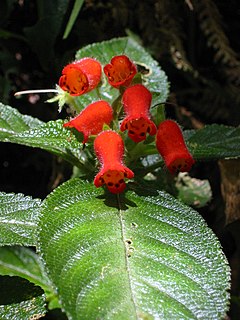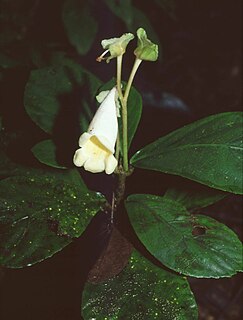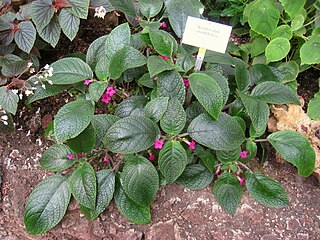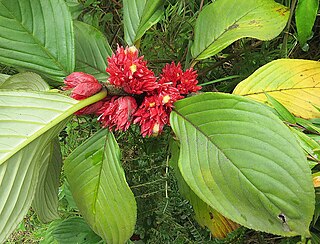Norske Skogindustrier ASA or Norske Skog, which translates as Norwegian Forest Industries, is a Norwegian pulp and paper company based in Halden, Norway and established in 1962. The corporation is the world's largest producer of newspaper (newsprint) and magazine paper, with 18 mills around the world.

Columnea is a genus of ca. 200 species of epiphytic herbs and shrubs in the flowering plant family Gesneriaceae, native to tropical America and the Caribbean. The tubular or oddly shaped flowers are usually large and brightly colored – usually red, yellow, or orange – sometimes resembling a fish in shape. A common name is flying goldfish plants due to the unusual flower shape.

Kohleria is a New World genus of the flowering plant family Gesneriaceae. The plants are generally tropical herbs or subshrubs with velvety stems and foliage and brightly colored flowers with spots or markings in contrasting colors. They are rhizomatous and commonly include a period of dormancy in their growth cycle. The genus was revised in 1992 and was then recognized as having 19 species distributed in Central America and South America. [Phylogenetics|phylogenetic]] in 2005 indicated that the epiphytic genus Capanea is derived from within Kohleria, and the two species of Capanea were subsequently transferred to Kohleria. The genus Pearcea is closely related.
Laurence Edgar Skog is an American botanist who specializes on the flowering plant family Gesneriaceae.

Pearcea is a South American genus of 17 species of tropical herbs in the flowering plant family Gesneriaceae. It is classified in tribe Gloxinieae and is closely related to the genus Kohleria, in which some of its species were previously included. The genus Parakohleria has recently been synonymized under Pearcea, a conclusion later supported by molecular analyses that showed that Pearcea hypocyrtiflora was nested within the former Parakohlerias.

Gasteranthus is a genus of 35 species of herbs and soft-stemmed subshrubs in the flowering plant family Gesneriaceae. The species occur in Central America and South America, from southernmost Mexico to Bolivia. Numerous species are threatened with extinction, mainly due to deforestation. This is due to two reasons: For one thing, Gasteranthus species are native to countries in which destruction of primary forest runs rampant; also, these plants do not distribute well and therefore endemism is very frequent, for example on isolated mountain ranges.

Nautilocalyx is a genus of plants in the family Gesneriaceae.

Glossoloma is a genus of Neotropical plants in the flowering plant family Gesneriaceae. The species in the genus were formerly placed in Alloplectus. They are subshrubs with the leaves clustered at the ends of branches, and tubular flowers.

Corytoplectus is a genus in the plant family Gesneriaceae. Plants from Corytoplectus are found in Bolivia, Brazil North, Colombia, Ecuador, Guyana, Mexico Southwest, Peru, Venezuela, in the cloud-forests of the high cordillera. The genus contains c. 12 species. The genus differs from the closely related Alloplectus in having an erect umbellate inflorescence and berries. The type species is C. capitatus.
Amalophyllon is a genus of flowering plants belonging to the family Gesneriaceae.
Anetanthus is a genus of flowering plants belonging to the family Gesneriaceae.
Centrosolenia is a genus of flowering plants belonging to the family Gesneriaceae.
Cremosperma is a genus of flowering plants belonging to the family Gesneriaceae.
Cremospermopsis is a genus of flowering plants belonging to the family Gesneriaceae.
Niphaea is a genus of flowering plants belonging to the family Gesneriaceae.
Fieldia is a genus of flowering plants in the family Gesneriaceae, native to New South Wales, Queensland and Victoria in Australia. It has at times been treated as monotypic, with one species, F. australis. Two are accepted as of April 2021 by sources that include Lenbrassia in Fieldia.
Cobananthus is a genus of flowering plants in the family Gesneriaceae, with a single species Cobananthus calochlamys. It is sometimes included in the genus Alloplectus, but molecular phylogenetic studies suggest that the two genera are not closely related, with Cobananthus more closely related to Alsobia.
Rufodorsia is a genus of epiphytic flowering plants in the family Gesneriaceae. The genus name refers to the reddish back of the upper lobes of the flower. The relationship of Rufodorsia with the genus Oerstedina is uncertain, as of April 2021. It is native to montane cloud forest in Central America.
Oerstedina is a genus of epiphytic flowering plants in the family Gesneriaceae, native to Mexico, Costa Rica and Panama. The relationship of Oerstedina to the genus Rufodorsia is uncertain, as of April 2021.
Lampadaria is a genus of flowering plants belonging to the family Gesneriaceae.






